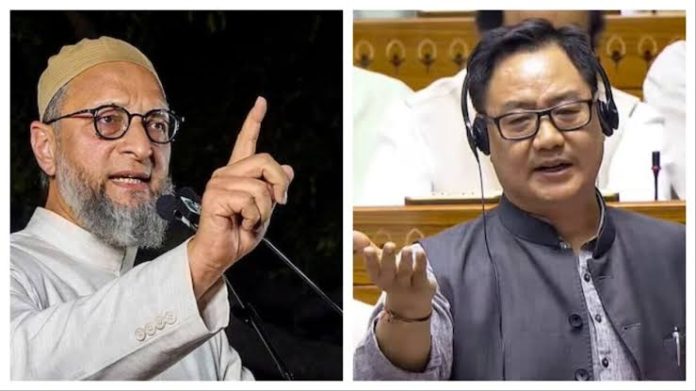New Delhi: Union Minister for Minority Affairs, Kiren Rijiju, has triggered a political firestorm after claiming that India’s minority communities receive more government support than the Hindu majority. His remarks, made during an interview with The Indian Express, have been met with severe backlash, particularly from AIMIM chief Asaduddin Owaisi, who denounced the statement as “dangerous propaganda”, as per a report by the Maktoob Media.
In the interview, Rijiju asserted, “Minority communities are receiving more funds and support from the government than the majority community, the Hindus. Whatever the Hindus get, the minorities also do. But what the minorities get, the Hindus don’t.” Sharing the interview on social media platform X, Rijiju added, “INDIA is the only country where the minorities get more benefits and protections than the majority community!”
Owaisi swiftly responded, criticizing the Minister’s comments as misleading and constitutionally inaccurate. “You are a Minister of the Indian Republic, not a monarch. You hold a constitutional post, not a throne. Minority rights are fundamental rights, not charity,” Owaisi said.
Highlighting the discrimination and violence faced by Indian Muslims, Owaisi asked, “Is it a ‘benefit’ to be called Pakistani, Bangladeshi, jihadi, or Rohingya every day? Is it ‘protection’ to be lynched or to see our homes and masjids bulldozed?”
He accused the government of systematically marginalizing Muslims through policy rollbacks and targeted demolitions. “You discontinued the Maulana Azad National Fellowship, defunded pre-matric scholarships, and limited post-matric and merit-cum-means scholarships—all because they benefited Muslim students,” he added.
Owaisi also questioned the double standards in religious administration, saying, “Can Muslims be members of Hindu Endowment Boards? No. But your Waqf Amendment Act forces non-Muslims onto Waqf Boards and allows them to form a majority.”
In a direct rebuttal to Rijiju’s comparison of India with neighboring countries, Owaisi stated, “Stop comparing our great nation with failed states like Pakistan, Bangladesh, Myanmar, Nepal, and Sri Lanka. Indian Muslims didn’t flee from the British, partition, or past massacres. We don’t flee. We fight for our democratic rights.”
Rijiju, defending his stance, reiterated that welfare schemes of his ministry offer “additional benefits” to minorities and justified changes in scholarship funding by citing misuse and the need for “rationalisation.” He referred to past instances of alleged fake beneficiaries in minority institutions and said reforms are underway to ensure transparency.
He also defended the Waqf (Amendment) Act, 2025, calling it a “historic reform” aimed at better governance of Waqf properties. On the drastic cut in budget allocation for minority education—down from ₹1,575.72 crore to ₹678.03 crore—Rijiju claimed it was not a reduction but a “conceptual shift” focusing on targeted disbursement based on demand.
However, his remarks have drawn criticism across social media and civil rights groups. Activists argue that Rijiju’s comments are not just misleading but seek to foster resentment among the Hindu majority by portraying minorities as over-privileged.
A social media user, @th_anonymouse, wrote: “The so-called ‘extra support’—scholarships, skilling, Hajj facilitation—are not luxuries, they are constitutional entitlements to uplift disadvantaged communities. That’s affirmative action, not appeasement.”
The group Youth Against Hate also released a list of recent demolitions allegedly targeting Muslim communities under BJP-led state governments. These include:
8500 homes near Chandola Lake, Ahmedabad
450 homes in Bapunagar, Ahmedabad
667 homes in Goalpara, Assam
93 in Nalbari, 218 in Lakhimpur (Assam)
22 homes and a mosque in Sambhal, Uttar Pradesh
600 homes in Jamnagar, Gujarat
17 buildings in Mumbra, Maharashtra (each with 50–60 apartments)
4111 houses in Kudalwari, Pimpri-Chinchwad
350 homes in Bet Dwarka, Gujarat
The group questioned, “If your government truly doesn’t hate minorities, can you order the reconstruction of these homes belonging to poor citizens?”
Criticism of the Modi government’s treatment of minorities is not new. Amnesty International, Human Rights Watch, and other international rights organizations have repeatedly accused the BJP-led administration of fostering systemic discrimination, promoting hate speech, and using demolitions as extrajudicial punishment. Amnesty’s 2024 report stated over 2,840 properties belonging to Muslims were unlawfully demolished between 2020 and 2022.
“The BJP government’s discriminatory and divisive policies have created a pervasive environment of fear among minorities,” said Meenakshi Ganguly, deputy Asia director at Human Rights Watch.
Owaisi concluded his rebuttal by affirming the Indian Muslim community’s resolve: “We know how to fight for our democratic rights, and we will, Inshallah.”




